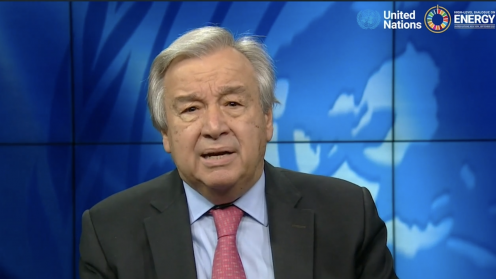The week of Ministerial Thematic Forums on Energy, which feed into the High-level Dialogue on Energy (HLDE), scheduled for 20 September 2021 during the UN General Assembly, formally opened today in an online format. The Forums will produce the major input to the HLDE, the first global gathering on energy under the auspices of the General Assembly since the UN Conference on New and Renewable Sources of Energy held in Nairobi in 1981. The HLDE is envisioned as a historic opportunity to provide transformational action in the first years of the Sustainable Development Goals (SDGs) Decade of Action and support the implementation of the Paris Agreement on climate change.
The week’s grand opening heard remarks by UN Secretary-General António Guterres, the HLDE Secretary-General, UN Under-Secretary-General Liu Zhenmin, and the two HLDE Co-Chairs, Achim Steiner, UN Development Programme (UNDP) Administrator, and Damilola Ogunbiyi, Special Representative of the Secretary-General for Sustainable Energy for All (SEforALL). Guterres said the world is “running far behind in the race against time” to achieve Sustainable Development Goal (SDG) 7 on affordable, reliable, sustainable and modern energy for all by 2030, and the goal of net-zero emissions by 2050. He called for speeding up progress and raising ambition.
Liu explained that the week’s five Thematic Forums will produce two outcomes: a summary that will inform a roadmap for concrete actions toward achieving clean and affordable energy for all by 2030 and net-zero emissions by 2050; and a series of “energy compacts,” voluntary commitments toward achieving these goals. Steiner said the world “stands on the cusp of a historic tipping point,” a clean energy revolution that will radically reshape our economies and societies, “but how fast and how fairly it happens is up to us.” Ogunbiyi stressed the importance of the energy compacts, noting that as many as 25 will be shared this week and encouraging all to announce them as soon as possible.
The Rockefeller Foundation and the IKEA Foundation announced a joint USD 1 billion energy compact to build a global platform to empower one billion people with renewable energy within 10 years, which is expected to save at least one billion tons of carbon emissions.
Google informed participants of their commitment to source only carbon-free energy by 2030, and urged others, whether companies, cities or institutions, to join them in a "24/7 carbon free energy by 2030" coalition.
During the Ministerial Segment on Energy Access, statements were made by a youth advocate and by the Global Theme Champions on Energy Access, China, the European Union, Japan, Kenya, Malawi, the Netherlands, the Russian Federation and Saudi Arabia.
Co-Chair Steiner then summarized the report of the Technical Working Group on Energy Access, which met during spring 2021. He said it highlights the need to put people at the center of discussions on energy systems and powering economies. He said the report outlines that access to clean cooking must increase from 66% to 82% to 100% by 2030, and access to electricity must increase from 82% in 2019 to 94% by 2025 and aim for 100% by 2030.
The introduction of the report was followed by a “leadership conversation” featuring representatives of the Clean Cooking Alliance, the Self-Employed Women’s Organization, the Alliance of Civil Society Organisations for Clean Energy Access, and Student Energy.
Global Multi-Stakeholder Dialogues
Prior to the day’s Global Opening and Ministerial Segment two multi-stakeholder dialogues were held on the energy access theme: one on achieving universal access to clean cooking solutions, the other on achieving universal access to electricity.
Achieving Universal Access to Clean Cooking Solutions: This dialogue featured two panels on action commitments.
The first panel addressed creating enabling conditions, with panelists calling for, inter alia: international help for governments to formulate actionable plans and compacts that include clean cooking; a viable, robust, fully inclusive, and sustainable clean cooking industry; and making gender a key part of agreements and financing.
The second panel dealt with creating markets for innovative solutions and focused on, inter alia: innovative or non-market solutions for affordability such as waiving taxes or subsidizing clean cooking and household energy; capacity building and support for local manufacturing; research on transition technologies, including hemp or crop wastes; and innovations in financing instruments and business models.
Achieving Universal Access to Electricity: This dialogue featured three moderated panels.
The panel on decentralized energy called for a paradigm shift by, inter alia¸ adopting an integrated approach that recognizes the end goal of an electrified economy with electric cooking and electric mobility. They emphasized the need for better fiscal allocation and targeted financial tools that can support both large and small providers.
The panel on sharing knowledge and good practices called for increased use of digital tools such as the internet and social media to share information in real time, focusing not only on supply but also demand data. They also noted the need for capacity needs assessments as well as efforts to address the needs identified.
The panel on advancing electricity access leaving no one behind discussed how to ensure energy access for the poorest and most marginalized communities, such as displaced populations. They pointed out that displaced populations are often not recognized when addressing energy access as these populations are isolated or illegally in the host countries. Speakers also called for empowering host communities and countries to include these displaced populations in current and future energy action plans in order to ensure no one is left behind.
To receive continuing coverage of this event delivered to your inbox, subscribe to the ENB Update newsletter.











